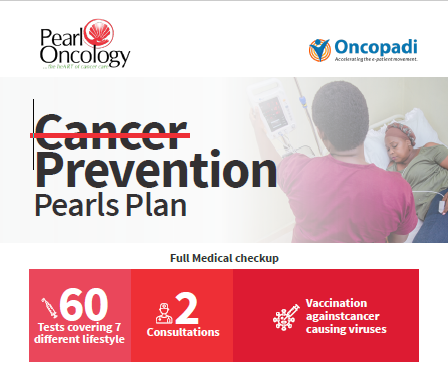Twelve ways to crack down cancer
The rate at which people are developing cancer is alarming. Have you seen the startling statistics? Every year, more than 120,000 Nigerians are diagnosed with cancer and about 80,000 deaths occur, meaning about 2/3 of people who have cancer die from it. Okay…take a deep breath, we know people are so scared of the word cancer and we are here to demystify this topic. The good news is that 40% of these cancers are preventable, which means you can do something to lower your risk of developing cancer. Let’s dive into it.
What is cancer?
Cancer is a disease in which good cells become nasty cells. They grow uncontrollably and spread to other parts of the body such as the brain, lungs, liver etc. This spread can make cancer life-threatening.
What are the risk factors?
Leading causes of cancer are tobacco, alcohol, poor diet, physical inactivity, radiation exposure and infections and viruses. Luckily, we can reduce our consumption and exposure to these risk factors.
What is the big deal about cancer screening?
Some cancers are silent and do not cause any symptoms so they go undetected for some time while some cancers cause a precancerous stage (abnormal cells that may become cancer) also known as stage 0. If this stage is detected, several medical interventions can be done to prevent progression to full-blown cancer (Stage I-IV). This is why your annual medical check-up and cancer screening is soooo important. You must understand the benefits and harms of screening tests and make an informed choice about which screening tests are right for you.
Here are twelve actionable cancer prevention tips:
- Eat a Healthy Diet: Ensure that you eat lots of fruits and vegetables and include grains and beans in your diet. Reduce how you consume red meat, fats and oils, food preservatives and high-calorie foods such as pastries, snacks etc.
- Stop Smoking: Avoid all forms of tobacco-Shisha, cigarettes, snuff, betel nut and second-hand/passive smoking. Science and research have established that tobacco contains more than 50 chemicals that cause lung, mouth and many other cancers.
- Practice safe sex: Whether you are a man or woman, having unprotected sex and or multiple sexual partners increases your risk of getting infected with the Human Immunodeficiency Virus (HIV), Human Papilloma Virus (HPV) and Hepatitis B Virus (HBV). These viruses are transmitted through vaginal, anal, or oral sex with someone who has the virus.
Reducing your exposure is as simple as ABC.
A – Abstinence (not apple)
B – Be faithful to your partners (not ball)
C – use a Condom the right way (not cat)
- Cancer screening is checking for precancerous cells or cancer in people who have no symptoms. This is why your annual medical check-up and cancer screening is so important. Select a Cancer Prevention Plan today. Screening tests include the following:

Clinical encounter: A thorough history is taken about your past and current health, family history and cancer risk assessment. This is followed by a physical examination and vital signs measurement.
Laboratory tests: Your blood, urine and faeces samples may be collected. These are used in checking for signs of cancers and other markers in the body.
Imaging procedures: Pictures of certain organs in the body will be taken to pick up abnormalities.
Genetic tests: A laboratory test where your blood, saliva or tissue samples are collected. These are studied to look for abnormal changes in genes.

- People living with HIV and Hepatitis B Virus have a higher risk of developing some types of cancer compared with uninfected people such as Kaposi sarcoma, Liver cancer, non-Hodgkin lymphoma, and Cervical cancer.
- Vaccinations to prevent some cancers such as HPV vaccine against cervical cancer and HBV vaccine against Hepatitis B.
- Avoid direct contact with the sun on your skin. Stay under the shades. Ensure to cover up exposed areas of your body. Make sure to use an adequate amount of Sun Protection Factor (SPF) on your uncovered skin. This is especially important for light-skinned people and albinos.
- Avoid exposure to chemicals that can cause cancer: Wondering what chemicals? There are a lot of them such as asbestos used for roofing products, benzene used in paints and pigments. Occupational exposure to these chemicals can be through inhalation or skin contact. This puts workers at risk of developing cancer of the lungs and mesothelioma. It is important to limit exposure, ensure adequate ventilation and wear protective gear like masks and gloves when handling chemicals.
- Increase water intake, reduce alcohol and sugar-sweetened drinks: Avoid excess alcohol intake and stay hydrated by drinking lots of water and moisturizing your skin. Limit alcohol and sugar-sweetened drinks.
- Increase physical activity and maintain a healthy weight: Regular, active exercise can prevent risks of diabetes, heart disease, breast and other cancers. Health experts recommend you engage in exercise for 30 minutes a day, at least thrice a week. More people are getting active and that’s so great…We hope you are one of them. If you are not, let us talk.
- Get enough sleep: Adults who get less than 6 hours of sleep per 24-hour period are more likely to be obese, stressed out, physically inactive and smokers. They are more likely to develop chronic health conditions when compared to people who get enough sleep. Daily, your body goes through the wear and tear process and you can heal it by getting enough sleep >7 hours. Please don’t tell us that you have a lot of work…
- Know your family history: Start screening early to detect cancer early and to reduce the chances of dying from cancer.
These tips are not exclusive or limited to just these twelve, but they will significantly help you live a healthy lifestyle.
Have a question?
Consult with our Preventive Oncology Experts on the Oncopadi Mobile App or Walk into our Pearl Oncology Clinic, Lekki Phase 1, Lagos.


